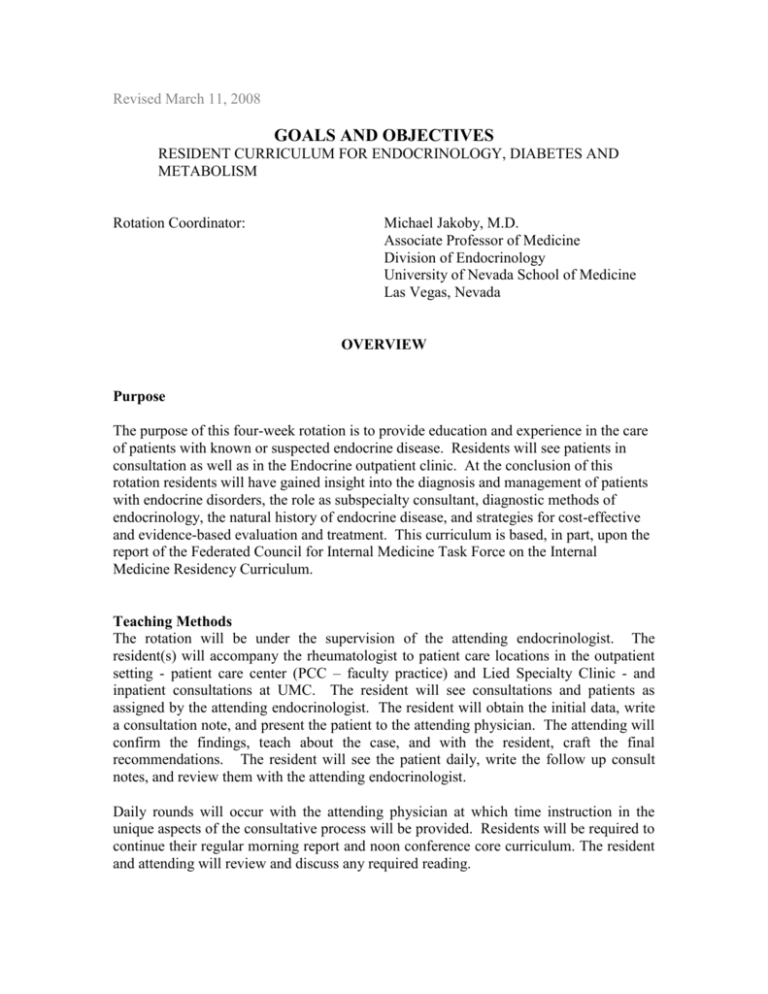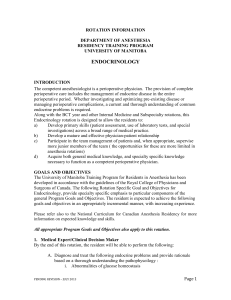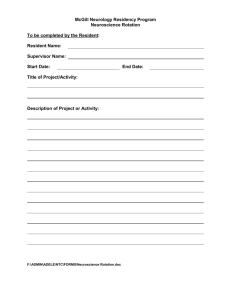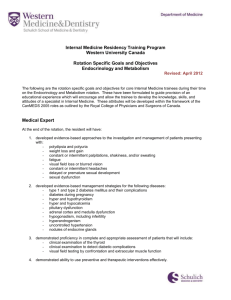Endocrinology - University of Nevada School of Medicine
advertisement

Revised March 11, 2008 GOALS AND OBJECTIVES RESIDENT CURRICULUM FOR ENDOCRINOLOGY, DIABETES AND METABOLISM Rotation Coordinator: Michael Jakoby, M.D. Associate Professor of Medicine Division of Endocrinology University of Nevada School of Medicine Las Vegas, Nevada OVERVIEW Purpose The purpose of this four-week rotation is to provide education and experience in the care of patients with known or suspected endocrine disease. Residents will see patients in consultation as well as in the Endocrine outpatient clinic. At the conclusion of this rotation residents will have gained insight into the diagnosis and management of patients with endocrine disorders, the role as subspecialty consultant, diagnostic methods of endocrinology, the natural history of endocrine disease, and strategies for cost-effective and evidence-based evaluation and treatment. This curriculum is based, in part, upon the report of the Federated Council for Internal Medicine Task Force on the Internal Medicine Residency Curriculum. Teaching Methods The rotation will be under the supervision of the attending endocrinologist. The resident(s) will accompany the rheumatologist to patient care locations in the outpatient setting - patient care center (PCC – faculty practice) and Lied Specialty Clinic - and inpatient consultations at UMC. The resident will see consultations and patients as assigned by the attending endocrinologist. The resident will obtain the initial data, write a consultation note, and present the patient to the attending physician. The attending will confirm the findings, teach about the case, and with the resident, craft the final recommendations. The resident will see the patient daily, write the follow up consult notes, and review them with the attending endocrinologist. Daily rounds will occur with the attending physician at which time instruction in the unique aspects of the consultative process will be provided. Residents will be required to continue their regular morning report and noon conference core curriculum. The resident and attending will review and discuss any required reading. Mix of Diseases The patients seen will represent the very wide spectrum of endocrine disorders encountered in our inpatient setting and outpatient clinics. The resident will become knowledgeable with the diagnosis, management, and complications of the following endocrine disorders: 1. Type 1, 2, and gestational diabetes mellitus and hypoglycemic disorders 2. Disorders of lipid metabolism 3. Care of the surgical patient with diabetes 4. Thyroid disorders (hyperthyroidism, hypothyroidism, thyroid nodules, thyroiditis, and thyroid cancer) 5. Disorders of calcium and skeletal metabolism (hyperparathyroidism, osteoporosis, hypercalcemia of malignancy, hypocalcemia, hypomagnesemia); 6. Disorders of the pituitary (prolactinomas, acromegaly, non-secreting tumors, pre-operative evaluation and post-operative care); 7. Hyponatremia, diabetes insipidus, SIADH; 8. Disorders of the adrenal gland (adrenal insufficiency, Cushing’s syndrome, hirsutism, endocrine hypertension, incidental adrenal masses); 9. Hypogonadism, and sexual dysfunction; 10. Endocrine emergencies (diabetic ketoacidosis, hyperosmolar coma, adrenal insufficiency, pituitary apoplexy, thyroid storm, myxedema coma). The resident will learn to evaluate and manage common endocrine disorders but recognize one’s limitations and learn to refer appropriately. The resident will learn to identify the endocrinologic implications of abnormal serum electrolytes, hypertension, and fatigue. The resident will become proficient in the use of the major pharmacotherapies used to treat endocrine diseases especially diabetes mellitus, and hyperlipidemia. The resident should know their indications, contraindications, dosages, side effects and toxicities. Patient Characteristics There is a diverse patient population, male and female, of all ages from adolescent to geriatric, representing most ethnic and racial backgrounds, from all social and economic strata. The hospital serves primarily the indigent population of the city of Las Vegas. Types of Clinical Encounters This rotation is predominantly an outpatient experience. Residents, under the supervision of full-time faculty board-certified in endocrinology, attend a variety of outpatient endocrine clinics each week. The resident will have first contact experience with most patients. They will be responsible for reviewing the patient record to obtain pertinent information, obtaining the patient history and performing a physical examination. They will write a progress note consisting of a concise synthesis of the above, an assessment and a management plan. They will then present the case to the attending physician. On occasion, the resident will merely “shadow” the attending physician. Residents will also provide inpatient consultations for patients on the resident services as well as patients admitted to private services. In conjunction with the attending physician, the resident can evaluate the patient record, obtain a patient history and perform a physical examination. The resident should write and dictate an initial history and physical examination, and any follow-up progress notes. Subsequent visits will occur at a rate appropriate to ensure excellence in patient care and education. Residents are encouraged to do literature searches, provide articles and should then relay the final recommendations to the consulting physician and/or team primarily responsible for the patient. Residents are encouraged to write a case report or participate in a clinical research project. During the rotation the resident will choose a case or case to be presented and discussed at Morning Report. Close interaction with various other healthcare team members including care managers, discharge planners, home health agencies, inpatient nurses, respiratory therapists, physical therapists, and patient care technicians occurs daily. Procedures No procedures are currently performed during this rotation. Resident Supervision Residents have daily personal supervision in their patient care activities. The rotation will be under the supervision of the attending endocrinologist. The resident(s) will accompany the endocrinologist to patient care locations in the outpatient setting; patient care center (PCC), Lied Clinic and inpatient consultations at UMC as assigned. The resident will see consultations and patients as assigned by the attending rheumatologist write initial and follow up consult notes and review them with the attending rheumatologist. TRAINING SITES University Medical Center All of the inpatient endocrine consultation experience occurs at University Medical Center (UMC) under the supervision of one of the full-time endocrine faculty. The resident will also participate in the UMC outpatient endocrinology clinic on the second and fourth Thursday of each month. UNSOM Faculty clinic (Patient Care Clinic) and Lied Specialty Care Clinic The resident will participate in this endocrine outpatient clinic under the supervision of the full-time endocrine faculty. CORE EDUCATIONAL MATERIAL Didactic Teaching Morning Report Residents rotating on the endocrinology service are required to maintain greater than 60 % attendance at morning report. Morning Report begins at 8 a.m. on Monday through Thursday and at 8:30 a.m. on Friday. Noon Conference Residents rotating on the endocrinology service are required to maintain greater than 60 % attendance at noon conference. Noon conference occurs daily, Monday through Friday. These sessions cover the basic core curriculum, and other curriculum topics such as ethical issues, geriatrics, computer systems and informatics, health care systems, occupational and environmental health issues, and other topics of concern. An endocrinology topic is presented at least once during each month. Attending Rounds Didactic discussions will be held regarding all patients seen in consultation during the month. Each resident and medical student will be required prepare and discuss during teaching rounds one article or endocrinology topic each week. Teaching rounds by the attending physician will occur every day for 45 - 60 minutes after regular management rounds. Each resident is required to review common endocrinology topics. Recommended Reading Listed below is the bibliography used to teach residents during the rotation. 1. Wartofsky L. Update in Endocrinology. Amer Coll of Phy 2001, vol 135, no 8(part 1):601-609. 2. Ford E.S., Giles W.H., Dietz W.H. Prevalence of the Metabolic Syndrome Among US Adults. JAMA 2002, vol 287. no. 3:356-359. 3. Knowlez W.C., Barrett-Connor E., Fowler S.E., et al. Reduction in the Incidence of Type 2 Diabetes with Lifestyle Intervention of Metaformin. NEJM 2002, vol 346, no 6:393-403. 4. Stern M.P., Williams K., Haffner S.M. Indentification of Persons at High Risk for Type 2 Diabetes Mellitus: Do We Need the Oral Glucose Tolerance Test? Amer Coll of Phy 2002, vol 136, no 8:575-581. 5. Barr R.G., Nathan D.M., Meigs J.B., Singer D.E. Tests of Glycemia for the Diagnosis of Type 2 Diabetes Mellulitus. Annals of Int Med, vol 157, no 4:263-270. 6. Expert Committee on the Diagnosis and Classification of Diabetes Mellulitis. Report of the Expert Committee on the Diagnosis and Classification of Diabetes Mellulitis. Diabetes Care July 1997, vol 20, no 7:1183-1194. 7. UK Prospective Diabetes Study Group. Efficacy of atenolol and captopril in reducing risk of macrovascular and microvascular complications in type 2 diabetes UKPDS 39. Papers. 8. Umpierrez G.E., Isaacs S.D., Bazargan N., et al. Hyperglycemia: An Independent Marker of In-Hospital Mortality in Patients with Undiagnosed Diabetes. The Journal of Endocrinology & Metabolism 87(3):978-981. 9. Corcoy R., Cabero L., DeLeiva A. Gestational diabetes. Postgraduate Med 1992. vol 91 no.5 : 393-400. 10. Noth R.H., Krolewski A.S., Kaysen G.A., Meyer T.W. Schambelan M. Diabetic Nephropathy: Hemodynamic Basis and Implications for Disease Management. Ann of Intern Med 1989 110: 795-813. 11. The Diabetes Control and Complications Trial. Diabetes 1986 vol 35: 530-45. 12. Field J.B. Hypoglycemia 1989 vol.18 no.1: 27-41. 13. Summary of the Second Report of the NCEP on detection, evaluation, and treatment of high blood cholesterol in adults. JAMA 1993 vol.269 No.23: 3015-23. 14. Stone N.J. Secondary causes of Hyperlipidemia. Medical Clinics of North Am. 1994. vol.78 no.1: 117-141. 15. Brody M. B. Reichard R. A. Thyroid Screening. Postgrad Med. vol.98 no.2 : 54-66. 16. Fauchet A., Madec O.A., Lorcy Y et.al. Anithyroid drugs and Graves’ Disease: A Prospective Randomized Evaluation of the Efficacy of Treatment Duration. JCE&M. 1990 vol.70 no.3: 675-679. 17. Woeber K.A. Thyrotoxicosis and the heart. NEJM 1992 vol.327, no.2: 94-97. 18. Boigon M, Moyer D. Solitary thyroid nodules. Postgrad Med. 1995.vol 98.no.2: 7380. 19. Pronovost P.H., Parrris K.H. Perioperative management of thyroid disease. Postgrad Med 1995. vol 98.no 2: 83-98. 20. Robbins J, Merino M, Boice, J.D, et.al. Thyroid Cancer: A Lethal Endocrine Neoplasm. Ann of Intern Med. 1991. vol. 115. no.2: 133-147. 21. Benwitz N.L. Diagnosis and Management of Pheochromocytoma. Hospital Practice. 1990.: 163-177. 22. Trainer P.J. Grossman A. The Diagnosis and Differential Diagnosis of Cushing's Syndrome. Clinical Endocrinology 1990.317-328. 23. Cutler G.B., Laue L. Congenital Adrenal Hyperplasia due to 21-Hydroxylase Deficiency. NEJM 1990.vol 323, no. 26: 1806-1814. 24. Ross N.S., Aron D.C. Hormonal Evaluation of the Patient with An Incidentally Discovered Adrenal Mass . NEJM 1990. vol. 323. no. 20: 1401-1406. 25. Griffing G. T. Adrenocortical insufficiency: How to avert a medical emergency. The J of Critical Illness 1991. vol 6, no. 6: 540-554. 26. Kaye T.B., Crapo L. The Cushing's Syndrome: An Update on Diagnostic Tests. Ann of Intern Med. 1990.;112: 434-444. 27.Young W.F., Hogan M.J. Primary Aldosteronism: Diagnosis and Treatment. Mayo clin Proc. 1990. 65: 96-110. 28. Griffing G.T. Melby J.C. Hirsutism : Causes and Treatments. Hospital Practice. 1991: 43-58. 29. Forrest H.N., Cox M., Hong C., Morrison G., Bia M., Singer I. Superiority of Demeclocycline over Lithium in the Treatment of Chronic Syndrome of Inappropriate Secretion of Antidiuretic Hormone. NEJM vol. 298.no. 4: 173-177. 30. Klibanski A., Zervas N.T. Diagnosis and Management of Hormone-Secreting Pituitary Adenomas. NEJM. 1991. vol. 324, no. 12: 822-830. 31.Webster J., Piscitelli G., Polli A., et.al. A Comparison of Cabergoline and Bromocriptine in the Treatment of Hyperprolactinemic Amenorrhea. NEJM. 1994. 331:904-9. 32. Belezikian J.P. Management of Acute Hypercalcemia. NEJM. 1992. vol. 326, no. 18, 1196-1204. 33. Liberman U.A., Weiss S.R., Broll J, et.al. Effect of Oral Alendronate on Bone Mineral Density and the Incidence of Fractures in Postmenupausal Osteoporosis. NEJM. 1995 333:1437-1443. 34. Riggs B.L., Melton L.J. The Prevention and Treatment of Osteoporosis NEJM 1992. 327. no. 9: 620-628. 35. Diagnosis and Management of Asymptomatic Primary Hyperparathyroidism: Consensus Development Conference Statement. Ann Intern Med. 1991.114: 593-597. 36. Ellerington M.C., Hillard T.C., Whitcroft S.I.J., et.al. Intranasal Salmon Calcitonin for the Prevention and Treatment of Postmenopausal Osteoporosis. Calcif Tissue Int 1996. 59: 6-11. 37. Bone. H.G., Kleerekoper M. Paget's Disease of the Bone. JCE&M. 1992.vol. 75. no. 5: 1179-1182. 38. Melmed S. Acromegaly. NEJM. 1990.322: 966-976. 39. Oelkers W. Adrenal Insufficiency. NEJM. 1996 vol 335. no.16: 1206-1212. 40. Ralph A. DeFronzo, MD. Pharmacologic Therapy for type 2 Diabetes Mellitus. Ann of Intern Med.1999.vol.131. No.4:281-303. 41. Rederick L. Ferris III,M.D., Mathew D. Davis, M.D., and llyoyd M. Aiello, M.D. Treatment of diabetic Retinopathy. NEJM 1999. Vol 341. No.9: 667-678. 42. Eberhard Ritz, M.D., and Stephan Reinhold Orth, M.D. Nephropathy in Patients with type 2 Diabetes mellitus. NEJM 99. Vol 341. No.15. 1127-1133. 43. UK Prospective diabetes study (UKPDS) Group. Effect of intensive blood-glucose control with mergotmin on complication in overweight patients with type 2 diabetes(UKPDS 34). Lancet 1998. Vol.352, no.9131: 854-65. 44. Siri L. Kjos, M.D. and Thomas A. Buchanan, M.D. Gestational Diabetes Mellitus. NEJM 1999. Vol 341. No.23: 1749-1755. 45. Ilan Shimon, MD and Shlomo Melmed, MD. Management of Pituitary Tumors. 1998. Ann Intern Med. Vol 129. No.6:472-483. 46. Stephen Marx M.D.(Moderator), Allen M. Spiegel, M.D.et.al (discussants). NIH Conferene. Multiple Endocrine Neoplasia type I: Clinical and Genetic Topics. Ann of Intern Med. 1998. Vol 129.no.6:484-494. Ancillary Educational Materials Subspecialty Texts of Neurology, Pulmonary Medicine, Nephrology, Endocrinology, Infectious Diseases, Rheumatology as well as General Medical References (Harrison’s Principles of Internal Medicine, Cecil’s Textbook of Medicine) are available 24 hours a day, seven days a week in the resident lounge. Savitt Medical Library On-Line Residents have access to the on-line services of Savitt Library (the main library of the University of Nevada - Reno) via their computer in the resident room, Suite 300 of the 2040 W. Charleston Building. Access to this room is available 24 hours a day, seven days a week. Full text is available for many peer-review journals including, but no limited to: ACP Journal Club Annals of Internal Medicine British Medical Journal Cancer Circulation Journal of the American College of Cardiology The Lancet New England Journal of Medicine Stroke Also available on-line: Harrison’s Principle’s of Internal Medicine, 14th ed. Merck Manual, 17th ed. Guide to Clinical Preventive Services, 2nd ed. The Cochrane Library Medline and Grateful Med Databases Pathological Material and Other Educational Resources Residents are encouraged to review the pathological reports on patients for whom they have consulted and to follow the hospital care of those patients. If a patient with whom the resident has consulted should die and have an autopsy, the resident is encouraged to attend the post-mortem session. Competency-based Goals and Objectives Endocrinology Rotation Learning Venues Evaluation Methods 1. University Medical Center 2. University of Nevada School of Medicine Patient Care Center (ambulatory endocrinology practice) 3. Self study Competency Patient Care Level Specificity A. Attending Evaluation B. Nursing Evaluation R-1 = 1 R-2 = 2 C. Patient Evaluation D. Objective testing R-3 = 3 Evaluation Methods A, B Level Obtain an accurate history Learning Venues 1,2 Perform competent complaint-focused 1,2 A, B 1,2,3 1,2,3 physical exams Interpret laboratory and radiology data accurately Present cases accurately and succinctly Demonstrate effective and competent perioperative care of the patient with diabetes mellitus Competency: Medical Knowledge Demonstrate knowledge of basic evaluation and treatment of common endocrine disorders including diabetes mellitus, thyroid disorders, hyponatremia, osteoporosis, calcium metabolism, and hyperlipidemia Demonstrate knowledge of evaluation and treatment of less common endocrine disorders including adrenal disorders, disorders of the pituitary, and evaluation and treatment of hypogonadism Demonstrate effective consultation to medical and non-medical services Demonstrate knowledge of the treatment of common endocrine emergencies (diabetic ketoacidosis, hyperosmolar coma, adrenal insufficiency,). Demonstrate knowledge of the treatment of uncommon endocrine emergencies (pituitary apoplexy, thyroid storm, myxedema coma) Competency: Interpersonal Communication Skills Show understanding for different patient preference Maintain accurate medical records Communicate effectively to patient and medical support staff Communicate patients problems clearly with patient’s family Treat patients and families with respect/empathy Treat colleagues with respect 1,2 A 1,2,3 1,2 1 A A 1,2,3 Learning Venues Evaluation Methods Level 1,2,3 A,B,D 1,2,3 A,D 1,2 A 1,2,3 A,D 1,2,3 A,D Learning Venues 1.,2 Evaluation Methods A,B,C 1,2 1,2 A,B A, B, C 1,2,3 1,2,3 1,2 A, B, C 1,2,3 1,2 A, B, C 1,2,3 1,2 A, B, C 1,2,3 1,2,3 2,3 2,3 1,2,3 2,3 Level 1,2,3 Respect patient confidentiality 1,2 A, B, C Competency: Professionalism Learning Venues Evaluation Methods Treat team members, primary care1,2 givers, and patients with respect and empathy Understand, practice and adhere to a code 1,2 of medical ethics 1,2 Participate actively in consultations and A,B,C 1,2,3 Level 1,2,3 A,B,C 1,2,3 A 1,2,3 on rounds 1,2,3 Attend and participate in all scheduled conferences 1 attendance, A Competency: Practice-Based Learning Learning Venues 1, 2 Evaluation Methods A 1, 2,3 A,D 1,3 A 1,2,3 Learning Venues 2 Evaluation Methods A,B Level Review out comes of care and apply to care delivery Identify limitation of knowledge and take corrective action via the medical literature Present case to peers at morning report with bibliographic review supporting evidence-based care Competency: Systems-Based Practice Participate in and understand the utility of multidisciplinary diabetes center care (CDE, CNE, foot care specialist, endocrinologist) Level 1,2,3 1,2,3 1,2,3 EVALUATION A. Of Residents At the completion of each rotation, all clinical faculty are required to complete the standard ABIM resident evaluation form. All clinical faculty are encouraged to provide face-to-face feedback with the residents. The night-float resident is evaluated by one of the three service attendings. In addition, residents may receive interim feedback utilizing the ABIM’s Praise and Early Warning cards. B. Of Rotation and Preceptor All residents are encouraged to evaluate the rotation, and the clinical faculty member, at the completion of the rotation. This evaluation form is included at the end of this document. These evaluations are then converted to type and shared anonymously with the clinical faculty. The program director also discusses the rotation with the residents to ensure rotation quality and satisfaction. Endocrinology Rotation Resident Check List 1. Evaluation reviewed at mid-month and end of rotation by the supervising faculty member and resident. 2. Completed assigned readings 3. Attended all assigned activities (excluding scheduled time away, required clinics and emergencies). 4. Completed required morning report, case report abstracts and/or posters if assigned by the supervising faculty member. 5. Demonstrated understanding of the basic principals of endocrine consultation, diagnosis, and management. 6. Receive verbal feedback from attending at end of rotation. Intern/Resident Signature_________________________ Date___________________ Supervising attending__________________________ Date___________________ All items must be completed for rotation credit and checklist returned to the Department of Medicine by the rotation’s end.






